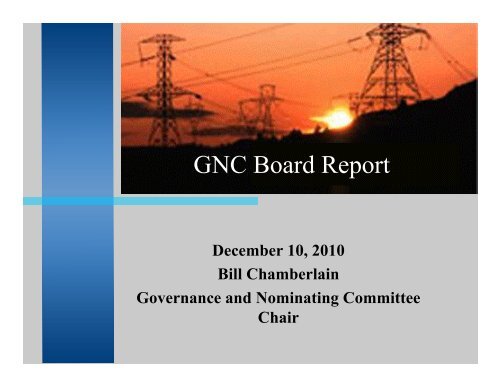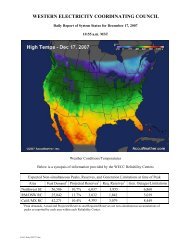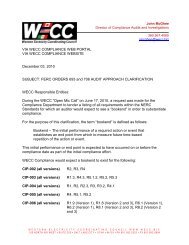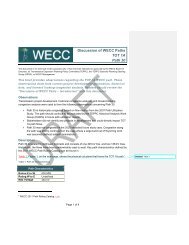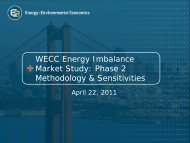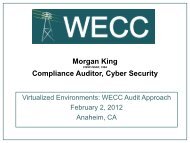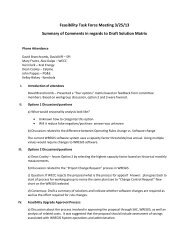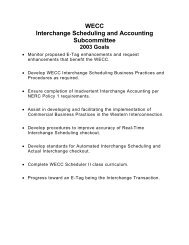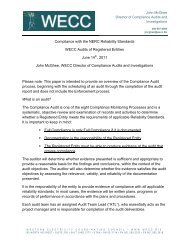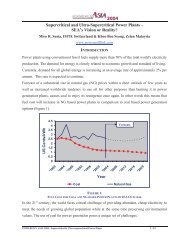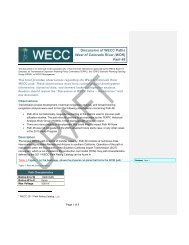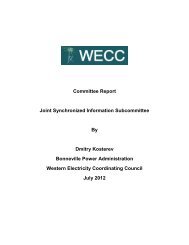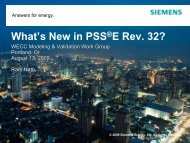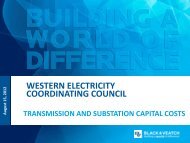16 GNC Presentation.pdf
16 GNC Presentation.pdf
16 GNC Presentation.pdf
- No tags were found...
Create successful ePaper yourself
Turn your PDF publications into a flip-book with our unique Google optimized e-Paper software.
<strong>GNC</strong> Board ReportDecember 10, 2010Bill ChamberlainGovernance and Nominating CommitteeChair
<strong>GNC</strong> Membership Section 7.7.1 of the WECC Bylaws requires adirector from Member Classes One to Six plusa NAD Current membership:– Mario Villar (Class One)– Dick Ferreira (Class Two)– John Stout (Class Three)– Steve LaFond (Class Four)—Vice Chair– Bill Chamberlain (Class Five)—Chair– David Erickson (Class Six)– Jananne Sharpless (NAD)
<strong>GNC</strong> Goals for 2010-11 Recruit NADs for election at the 2011Annual Meeting– Solicitation for candidates has provided<strong>GNC</strong> several promising nominees.– Interviews planned January 11-12, 2011.– Nominations to be announced at MarchBoard meeting. Complete Section 4.9 Review Board officer nominations for 2011-12
What Is the Section 4.9 Review? Two kinds of WECC Bylaws Amendments– Amendments the Board may adopt– Amendments the Members must approve Delegation Agreement Amendments Policies and charters that the Board canadopt without later obtaining NERC and/orFERC approval Focus now is on the creation of two Bylawsamendment packages for March and June
Section 4.9 Review Completion PlanToday—Status Report on Section 4.9 Issues February 14, 2011—– Post Bylaws amendments for Board adoption in March– Adoption in March provides time for any Member appeal to occurin time for Member vote on the appeal at the Annual Meeting inJuneMarch BOD meeting—– Approve Bylaws amendments that the Board can approve– Approve Charter amendments and policiesApril 22, 2011—Post Bylaws amendments that need MemberapprovalAnnual Meeting in June—– Obtain Member approval of Bylaws amendments and action onany appeals to Board approved amendments– Board may approve additional Charter amendments, policies, andrecommendations for further action
Section 4.9 Review Issues Compliance Governance Standards Development Process Member Committee Voting Procedures Review of Member Committee Org Chart Board Composition Issues– Add Class Seven Director(s)– Add CEO to the Board– NAD Member Nomination Threshold Review Board Committee Org Chart Delegation Issues
Section 4.9 Review—ComplianceGovernance Focus on this issue began in response to aproposed NERC recommendation to requirecompletely independent governance ofcompliance issues. A <strong>GNC</strong> Member survey on this issue disclosedinsufficient desire within WECC for change. NERC backed off in making its proposedrecommendation. Focus has shifted to FERC Auditrecommendations. <strong>GNC</strong> is awaiting WCC consideration of proposedWCC Charter amendments.
Section 4.9 Review—StandardsDevelopment Process (SDP)This issue began as a question whether the Boardshould have backstop authority to propose and approvea standard based on the recommendations of thoseMembers who support it when the standing committeeshave been unable to approve a standard the Boardbelieves is necessary for reliability. <strong>GNC</strong> is awaiting NERC amendments to its Rule 321that will define when the NERC Board can adopt astandard in response to regulatory directives even whenthe NERC ballot body rejects the standard.In the meantime, changes to the WECC VotingProcedures will include changes to the SDP which mayaffect the need for backstop authority.
Likely Elements of the New Rule 321 When a standard contains a response to aregulatory directive and is not approved, it willbe re-balloted and negative votes withoutcomments will only count toward a quorumand not toward disapproval. Board may consider approving a standardthat fails to achieve a 2/3 ballot approval butdoes achieve 60 percent approval. Ultimately, the ballot process can be avoidedaltogether if it fails to provide an acceptableresponse to a regulatory directive.
Section 4.9 Review—StandingCommittee Voting Procedures Following the extensive Board discussion ofthis issue in October, <strong>GNC</strong> has obtained fromLegal Counsel a draft of Bylaws and proposedDelegation Agreement amendments toimplement the guidance the Board provided. This draft will be posted In early January forcomment that will inform <strong>GNC</strong>’s decision nolater than February 14, 2011 for a posting forBoard approval in March. If approved, the amendments will also needapproval from NERC and FERC.
Section 4.9 Review of the StandingCommittee Organization Charts <strong>GNC</strong> has not identified a need for majorchanges in the current StandingCommittee Organization charts. Many agree that there is some overlap andduplication of effort between the ISAS ofthe OC and the MIS of the MIC. <strong>GNC</strong> is working with the OC and MICchairs to develop better procedures forminimizing conflicts in this area. No Bylaws amendments are required.
Section 4.9 Review—BoardComposition Issues Revision of Board Composition requires aBylaws amendment that either needs (a) twothirds approval of the Board and prior approvalby the Members or (b) two thirds Memberapproval. Member survey revealed no significant supportfor either:– Reducing the size of the Board to 26 by havingeach Member class elect only three directors– Making the Board completely independent witha stakeholder advisory committee
Board Composition: Add Class SevenDirector(s)? At the Annual Meeting in April, a Class SevenMember asked WECC to allow Class SevenMembers to elect one or more directors. Class seven is defined as members-at- large,that is, entities who have a legitimate interestin WECC but do not qualify for membership inany of the six classes that have the right toelect directors. David Erickson, <strong>GNC</strong>’s Class 6 Member, hasconduced a survey of Class Seven to gatherinformation on their needs.
Class 7 Board Representation Issue Currently, the WECC Bylaws define Class 7 as“members at large” (entities not eligible formembership in other classes and who have asubstantial interest in the purposes of WECC) There are 113 Class 7 Members Given the breadth of membership, Class 7 maynot have a common alignment of interests– Consultants, whose interests are most closely alignedwith their primary customers– Transmission or generation developers whose interestsare aligned with Class 2 or 3– Regional planning groups– Service providers14
Purpose of the Class 7 SurveyGather information on the following questions: Are Class 7 Members concerned about theirrepresentation in WECC? How many Class 7 Members are interested inparticipating in WECC Governance? What benefits do they derive from WECCmembership? What would constitute input at the Board level?– Membership on the Board?– Membership on Board committees?– Opportunities to advise the Board?15
Process for the Class 7 Survey Conducted from August 20 th to September 13 th Announcement did not indicate the responseswould be confidential However it was optional to provide theorganization name <strong>16</strong> out of 17 entities provided their organizationname Not all entities answered all questions orprovided comments on all questions No additional entities contacted WECC afterSeptember 13 th<strong>16</strong>
Summary of Survey Results Seventeen (17) surveys completed (out of 113members) Class 7 Members perceive a variety of Memberbenefits including:– Access to Data (e.g. base cases, new transmissiondevelopment)– Receive current information on WECC issues (e.g.technical details, coordination on regional transmissionprojects), policies, reliability standards– Ability to provide input to base cases, standards,policies, practices, etc.– Can participate on a variety of Committees, workinggroups, etc.17
Survey Results, cont’d.79% - feel they have adequate vehicles to provide input tothe BoardComments re vehicles for additional input included:– allow generation developers to become part of Class 3– participation in Board strategy and planning– allow Class 7 representation on the Board (as Class 7or as NA Director)– have a standing agenda item at Board meetings87% - did not have any specific issues come up in WECCthat they felt the interests of Class 7 were not represented71% - would not be willing to provide a representative onBoard-level committees if Class 7 Representatives wereadded18
Survey Results, cont’d. 85% - felt adding Class 7 representativesto Board Committees would meet anadditional need for Class 7 representation 50% would be willing to provide arepresentative to attend Board meetingsand represent Class 7 in other Board levelassignments, and 50% would not 76% had not contacted a WECC Boardmember regarding an issue at WECC19
Survey Results, cont’d. 50% cast a vote for Non-Afilliated Directorsin 2010, and 50% did not 50% felt their interests were beingaddressed through Classes 1 - 6 and 50%did not Recommendation: Given the current largesize of the Board and the lack of a cleardesire by Class Seven Members as a wholefor direct Board participation, <strong>GNC</strong>recommends taking no action at this time toadd directors elected by Class Seven.20
Board Composition: Add the CEO as aMember of the WECC BoardAn October Board resolution directs <strong>GNC</strong> toproceed with Bylaws amendments to allow theCEO to be a voting member of the Board.These amendments will need to be posted forMember approval no later than April 22, 2011.<strong>GNC</strong> is considering two ways to carry out theBoard’s direction:– Amend the Bylaws to permit the Board to make theCEO a voting member of the Board as a term of theCEO’s employment contract– Have the Bylaws define the Board to always includethe CEOWe will draft alternative Bylaw amendments andpresent them to you at the March Board meeting toobtain the Board’s guidance prior to posting.
Modify Member Non-AffiliatedDirector Nomination Threshold?The Bylaws currently permit any Member Class tonominate a NAD candidate upon the petition of threemembers or 10 percent of the class, whichever is greater.The Bylaws also require <strong>GNC</strong> to nominate NADcandidates with consideration of the need to provide abalance of skills and experiences on the Board.<strong>GNC</strong> will soon release a white paper for commentproposing alternative methods of increasing the thresholdfor Member nominations.After considering Member comments, a proposed changecould be posted as part of the package of amendmentsthat require WECC Membership approval in June.
Section 4.9 Review—BoardCommittee Organization Chart Issues There are nine committees that reportdirectly to the Board. No recommendation to eliminate FAC,<strong>GNC</strong>, HRCC, RPIC, TEPPC, or WCC RMSRCC to be eliminated when RMScontract is no longer necessary RCC still under consideration <strong>GNC</strong> expects to recommend in March thatOTCPC can be eliminated in this Section4.9 review.
Section 4.9 Review—Staff-Recommended Bylaws Amendments <strong>GNC</strong> has agreed with a staff recommendationto eliminate the prohibition in section 6.12against Board delegation of more than$50,000 signature authority for the CEO. This limitation will be replaced by a Boardresolution that is reviewed periodically. <strong>GNC</strong> has asked FAC to assist us in decidinghow much contracting authority the CEOshould have without Board action goingforward in 2011.
Section 4.9 Review—Staff-Recommended Bylaws Amendments <strong>GNC</strong> is also considering staff-generatedBylaws recommendations in the followingareas:– Streamline requirements for staff noticing ofMember voting status– Definition of Western Interconnection– Deletion of obsolete language– Modifying the effect of director abstentions– Additional technical corrections


